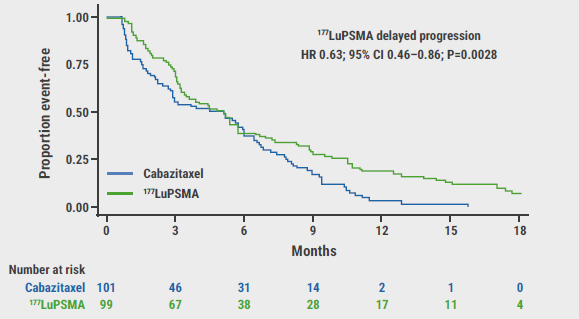The renin-angiotensin system plays a role in the proliferation of cells, blood cells, and connective tissue; it can also be involved in immunosuppression. Previous studies have suggested that ACEi and angiotensin receptor blockers (ARB) may suppress tumour growth, possibly by blocking transforming growth factor-β, which plays a role in bladder cancer.
Dr Jonathan Thomas (Beth Israel Deaconess Medical Centre, Massachusetts, USA) shared the results of his teams’ retrospective review [1]. The analysis included 133 males and 54 females with MIBC who were either treated or not treated with either ACEi or ARB while they were receiving NAC prior to radical cystectomy for MIBC. Of these 187 patients, 114 (61.0%) were treated with cisplatin/gemcitabine, while 53 (28.3%) received dose-dense methotrexate-vinblastine-adriamycin-cisplatin. Among the patients reviewed, 41 (21.9%) were taking an ACEi, while 24 (12.8%) patients were taking an ARB.
Among the 41 patients taking an ACEi, 17 (41.5%) achieved a pCR versus 36 (24.7%) of the 146 patients who were not taking an ACEi. Multivariable analysis identified only ACEi intake as being associated with pCR. ARB intake was not associated with pCR.
The 5-year overall survival (OS) was 64%. The only factor associated with significantly improved OS was pCR (HR 0.18; 95% CI 0.07–0.45; P<0.001). After adjusting for pCR, ACEi was not significantly prognostic of OS (HR 1.12; 95% CI 0.60–2.09; P=0.72). That is, while ACEi intake was associated with achieving a pCR (OR 2.17; 95% CI 1.05–4.48; P=0.037), it was not prognostic of OS; it was speculated that this finding is due to the presence of other factors which could result in patient death. Both OS and pCR were unaffected by ARB intake while receiving NAC.
Next steps should include validation of these findings with external data. Additionally, investigation should be conducted into the potential impact of ACEi/ARB in other treatment settings of MIBC, including a prospective trial to explore the effect ACEi and ARB intake during NAC treatment.
- Thomas J. Impact of angiotensin inhibitors on pathologic complete response with neoadjuvant chemotherapy (NAC) for muscle-invasive bladder cancer (MIBC). Abstract 220, ASCO Genitourinary Cancers Symposium, 11–13 February 2021.
Copyright ©2021 Medicom Medical Publishers
Posted on
Previous Article
« Better allocation of research dollars needed Next Article
Signature DNA alterations in subtypes of bladder cancer »
« Better allocation of research dollars needed Next Article
Signature DNA alterations in subtypes of bladder cancer »
Table of Contents: ASCO GU 2021
Featured articles
Prostate Cancer
Lu177 as a promising new therapy for metastatic prostate cancer
Role of prostate cancer genomics is evolving
Apalutamide prolongs progression-free survival in prostate cancer
Dose-intensified radiation therapy fails to provide better outcomes in prostate cancer
Intrinsic tumour biology may be predictive of treatment response in prostate cancer
Final TITAN trial results favour use of apalutamide
Penile Cancer
Prognosis of penile cancer associated with HPV status
Renal Cancer
Superior clinical outcomes and QoL with nivolumab plus cabozantinib in RCC
Lenvatinib plus pembrolizumab prolongs survival in renal cell carcinoma
Inflammatory markers may guide treatment decisions in metastatic renal cell cancer
Clinical trial exclusion criteria may lead to lack of evidence in real-world patients: how do the excluded fare?
Axitinib offers hope for improving renal cell cancer surgical outcomes
Cabozantinib as possible new first-line therapy in translocation renal cell carcinoma
Predictors of oral anti-cancer agent utilisation in renal cell carcinoma
Denosumab plus pembrolizumab in advanced clear cell renal cell carcinoma
Testicular Cancer
New prediction model for brain metastasis in germ cell tumours
Reduction in radiation exposure is possible in testicular seminoma surveillance
New therapeutic option for early metastatic seminoma
Urothelial Cancer
Poorer outcomes in bladder cancer predicted by race/ethnicity and gender
Enfortumab vedotin as a promising treatment option for bladder cancer: phase 3 results
Enfortumab vedotin as a promising treatment option for bladder cancer: phase 2 results
New standard of care recommended for patients with upper tract urothelial cancer
Signature DNA alterations in subtypes of bladder cancer
ACE inhibitors associated with superior responses in bladder cancer
Better allocation of research dollars needed
Better prediction of favourable responses to immune checkpoint inhibitors in mUC
Genitourinary Oncology
Researchers call for an overhaul of licensing and funding of anti-cancer drugs
Exploring a new strategy for metastatic germ cell tumours
Related Articles

July 18, 2024
Biomarkers for treatment of renal cell carcinoma
© 2024 Medicom Medical Publishers. All rights reserved. Terms and Conditions | Privacy Policy
HEAD OFFICE
Laarderhoogtweg 25
1101 EB Amsterdam
The Netherlands
T: +31 85 4012 560
E: publishers@medicom-publishers.com

